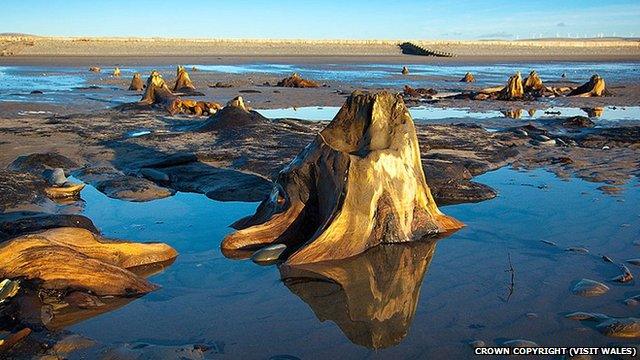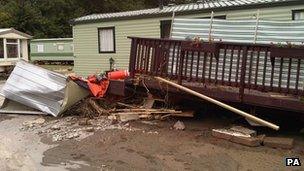Natural Resources Wales in 'important services' pledge
- Published

National Resources Wales aims to make sure that all Wales has sustainably managed, enhanced and used
The new body which will manage Wales' environment and natural resources is starting work.
Natural Resources Wales (NRW) becomes the nation's largest public body as it merges the Environment Agency, Forestry Commission and Countryside Council.
Its chairman Peter Matthews said it would focus on maintaining important services such as flood warnings.
Experts have urged it to plan properly, but concerns have been raised about its "tricky balancing act".
NRW will now have responsibility for everything from issuing flood alerts to managing Wales' national coastal path, which opened in 2012.
Mr Matthews said: "We face many challenges - for our communities, our economy and our environment.
"I believe that the natural resources we have in Wales can play their part in tackling them.
'Fresh approach'
"The natural environment is worth £8bn to the Welsh economy and as Natural Resources Wales, we want to build on this."
He added: "We will focus on maintaining the important services that people and businesses rely on, like our flood warning services, maintaining timber supply and protecting valuable sites."
Chief executive Emyr Roberts promised: "We will also begin to reshape the work we do with a fresh approach and new direction - to make the environment do more for the people, economy and wildlife of Wales."

The body takes over management of flooding in Wales
NRW becomes the country's largest public body and will come under close scrutiny.
Minister for Natural Resources Alun Davies said: "The natural environment really is crucial to our economy here in Wales so it is vital that it is managed as effectively and efficiently as possible.
"The Welsh government has created Natural Resources Wales because we believe one body will result in a more streamlined way of working and will ensure more effectively delivery and improved value for money."
Lower charges
As the new body starts operating there have been calls from different groups for it to work effectively.
Nigel Annett, managing director of Dwr Cymru Welsh Water, said it should bring savings and a more efficient regulating system.
"Putting three organisations together should make big savings and we are in Dwr Cymru the largest customer of the new body, and we would like to see some of the cost savings returned to our customers in the form of lower charges in the years to come," he said.
Botanist Ray Wood, who used to work for the Countryside Council of Wales, said NRW will have a tricky balancing act.
"We've got to do things better," he said.
"We've tended to be just reactive to things that have happened. Now is an opportunity to piece together some proper planning and a vision and the knowledge."
RSPB Cymru director Katie-Jo Luxton said the the environmental challenges were so grave that they were all now going to have to work far closer together and to pool resources more effectively.
"If NRW can do that it will do something really different. Did I think we had to merge bodies to achieve that? Probably not.
"We can achieve working together whether we're one body or three, quite frankly in my view. It's about how individuals work together, the political will and the resources that are put to it."
- Published30 March 2013
- Published27 March 2013
- Published27 March 2013
- Published26 March 2013
- Published25 March 2013